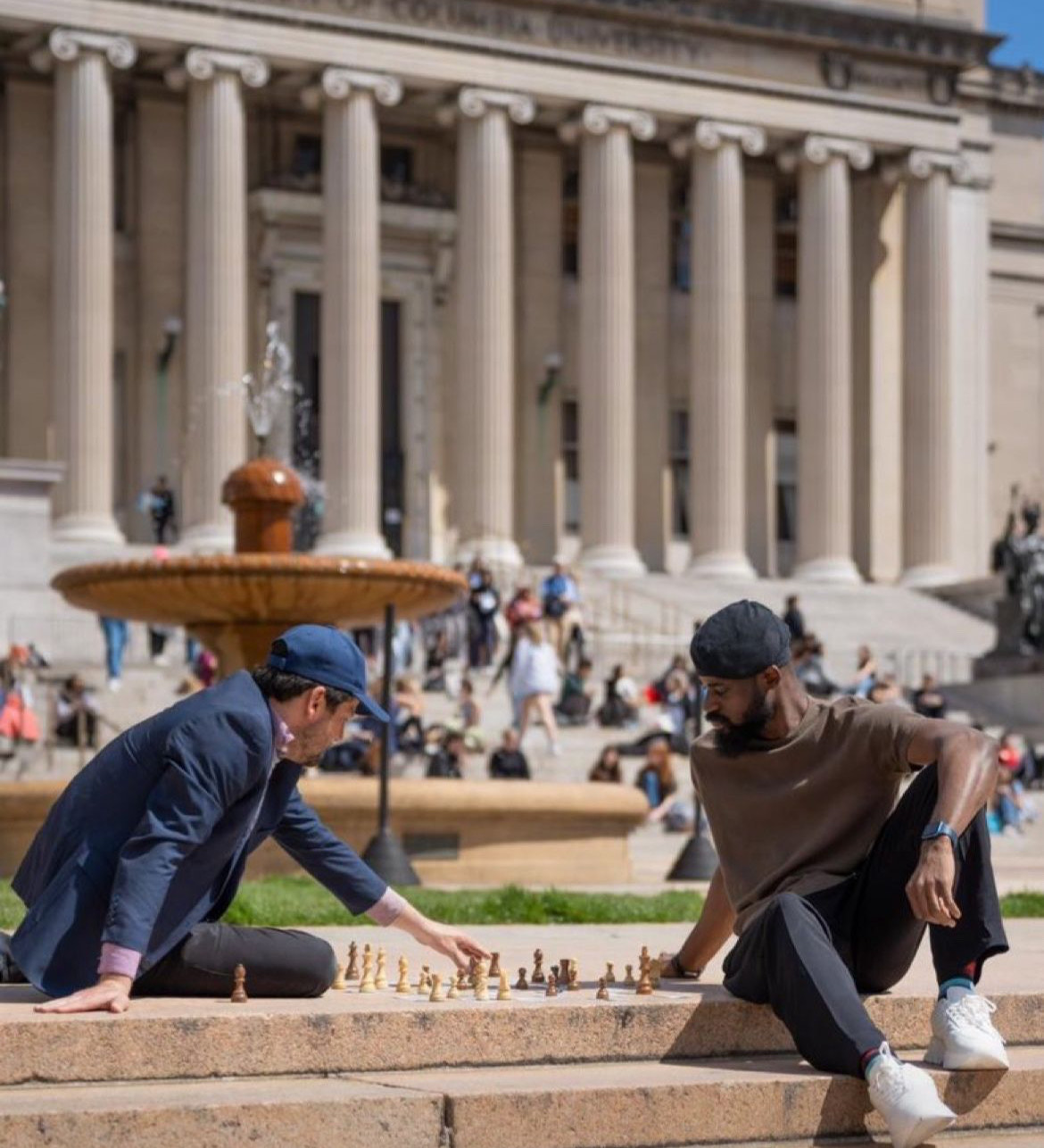The Gift of Chess: Tunde Onakoya and a Mandate Beyond the Chess Game

While the world system tucks the geniuses in the slums around the world, when imbalance social stratification amputates the potentials of many and racism denies many of their right to be humans, and resource distribution strangles numerous hopes and aspirations, we come—we embrace the sacred mandate and embark on the cause to snatch the slum from the jugular of despair, fears, and suffering that has choked its essence thus far.
The phrase “life” may be trundled in complexity, and shades of anguish may arise from the unequal distribution of social resources, tossing some into chasms of hopelessness, such that when life is plunged into the darkest depths, the firefly will reign supreme. I recently found, via close observation of the amazing impacts of chess organizations on forgotten slums and youngsters, that when you give a child a lever, he may reach incredible heights. As a result, my determination is that the simplest and most potent way to positively influence another person’s life comes from self first. The digging into oneself and somehow touching the center of existence and being the bearer of light allows one to light the candles of others’ destinies and teach them to carry the light on.
Growing up, I had a brief acquaintance with chess; there was a game spot that was usually crowded by elderly people and sparsely visited with young people in my neighborhood; the most common games were ‘Opon’, Ludo, and English draughts or checkers, which I mistook for chess for a long time until I later saw an incomplete and broken chess set at the home of a retired teacher. That day, I saw the difference: the different shapes of each character, as well as the separation of roles and authorities, making it even more wholesome—something I only recently learned. My next encounter was with Phiona Mutesi, a 10-year-old international chess champion, as shown in the film ‘Queen of Katwe’. In the movie, I experienced the miracle that a spark of light can bring when it is welcomed with tenacity and fanned with natural consistency—for Mutesi and others in Kampala’s slum, Robert Katende with chess sets was a peculiar visiting hope rather than ordinary formulaic to success or mere inspirational sport.
In the monumental word of the Bhagavad Gita, ‘those who commit to nothing are distracted by everything.’ Sometimes we arrive at the threshold when we know what we want; we lay hold of it and glue our gaze to its visage. Vehemently, we keep fighting because we know the consequences of quitting halfway are grim. We’ve seen people close to us give up their mandate halfway, and the implication that those close to them bear innocently—the brunt of their inactions—is heavy and painful to generations after them. For us, we refuse to be known for letting the world down. While the world system tucks the geniuses in the slums around the world, when imbalance social stratification amputates the potentials of many and racism denies many of their right to be humans, and resource distribution strangles numerous hopes and aspirations, we come—we embrace the sacred mandate and embark on the cause to snatch the slum from the jugular of despair, fears, and suffering that has choked its essence thus far.
When I joined Mr. Russell Mafoski’s ‘Gift of Chess‘ organization and learned about the objective to give a million chess sets around the world within a set time period, I felt privileged to be a part of such a significant cause. This is not to claim that the mandate is the most important; we just believe that spreading love is the most powerful movement. The boldest ambition of connecting the slum to the rest of the world, fueled by opportunities and privileges, would be realized. We’ve opted to broaden the purview of humanity beyond the present moment, rather than being perceived as a group too humanitarian to pass on misery and dread to future generations. that we may bring the long-celebrated new dawn, where inclusivity emanates from a genuine love and respect for everyone’s skills, values, and talents and is motivated by a desire to not only be the frontiers of good but also anchormen charged with carving progressive values and principles into the core-spirit of those who look to us as Messiahs.
Meanwhile, as a regular LinkedIn user, I puzzled why the post of a man wearing a uniquely fashioned local Yoruba cap over a T-shirt, sometimes on round-neck shirts, kept appearing on my page. Another time, he posts a group of young boys dressed in the cap and dress pattern, as if they all represent the same brand of clothing. However, reading through the captions on each of his posts reveals the condition of the unfortunate and the crushing weight of despair felt by the hopeless buried in the quicksand of Nigerian slums. It’s often delightful to read because of the sheer hope that this man and his team have been able to spread by going out of their way to snatch these young downtrodden out of the terrible clutch of potential waste, and light up their destinies through the Chess in the Slum initiative—that being my acquaintance with Mr. Tunde Onakoya and Chess in the Slum, as well as the source of my admiration for his mission and burning interest.






In life, however, desires may appear diverse and propelled by diversity. Human aspirations can be classified according to their magnitude and success stories, punctuated by diversity based on personal experience and projections. However, there is a phenomenon known as a melting pot in which almost all assumptions, prejudices, attitudes, worldviews, goals, and expectations collide to generate a shared reality. This universal reality, as I saw it, is best articulated by Seth Godin: “We all want to be safe, healthy, successful, loved, respected, happy, and fit.” We all want enough money to buy everything we want; we all want friends, entertainment, and a clean environment in which to enjoy them. This is the truth and cornerstone of the revolutionary effort started by ‘The Gift of Chess’, along with the highly reputable Chess Master, Tunde Onakoya, Russell Mafosky, and every Chess Clubs across the globe.
Notably, in the instance of the Gift of Chess, which collaborated with Tunde Onakoya on chess in the slum, a chessboard is the most powerful tool for arriving at this shared reality. Just as any other way could bring someone out of the deepest slum where the leitmotif is wasted potential and repetitive display of crushed hope into the splendor of a new story and recognition, according to Red Maxwell, ‘Lenses warp things.’ This means that, while perceptions may differ, the subject matter remains untouched. The other day, I came across the amazing story of Basirat, a young girl with an infectious smile who was discovered by Tunde Onakoya few years ago through one of the Chess in the Slum initiatives. The story of Fawaz, the young champion, remains delightful, as does the mastery of Joao of Portland, Maine; Jerremias ingenuity; Waris Muftau, presently representing Nigeria on the FIDE World Schools Rapid and Blitz Championship; or the interesting story of unequal Chess Goddess, Bernice Wambui, and numerous others whose lives have been illuminated by the sheer light of chess influences across the world. With humanity, love, and liberation as the anchor purpose, Tunde Onakoya and the Gift of Chess have partnered with several notable organizations to spread the gospel of hope that chess offers.
At its core, the goal is not to provide a million chessboards around the world, but rather, in depth, to present a million chances and reasons to dream from small places to everyone who believes chess brings hope and who sees a pawn as a transformative figure (experience) dependent on the ambition and readiness to deal with opportunities in the right and proactive manner. That lot will not become a puppet of life but rather an active participant in crafting our destinies, even when the most challenging thing to do is to dream.







